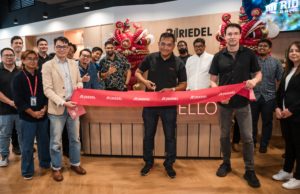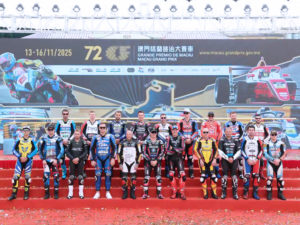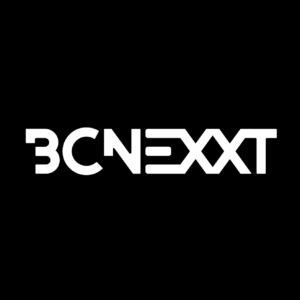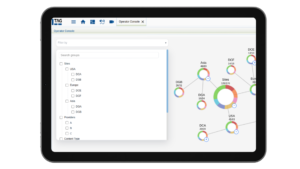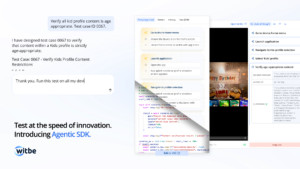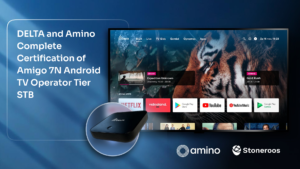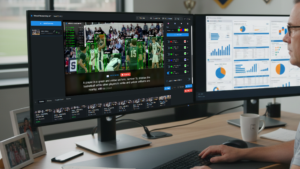
Broadcast technology has always been a complex business, and in order to address the many technical and logistical challenges that have arisen over the years it’s no surprise that it has also become a very collaborative business, too. In particular, as hardware has evolved and customer requirements have become more diverse, it’s often made sense for vendors to reach out to third-parties to provide specific elements or guidance for their new solutions.
This was certainly the initial impetus for the partnership between test & measurement innovator PHABRIX and display, touchscreen technology and specialized broadcast ODM company Densitron. The first major fruits of their collaboration – the PHABRIX QxP next-generation portable waveform monitor, featuring 7” LCD technology from Densitron, has now launched.

Phillip Adams, CEO and Founder at PHABRIX, recalls that he first made contact with Densitron in response to a very specific R&D challenge. “We were on the lookout for a higher-resolution screen for a new 3U instrument we were working on, which became the QxP,” he says. “We already had the 2U Rx 2000 audio/video monitoring solution, which featured a lower-resolution 480 x 272 pixel LCD screen, but for the 3U product we definitely wanted it to be HD resolution at least. And we were also looking to the future and the possibility of using a higher-resolution LCD display in a portable instrument.”
When the PHABRIX team was introduced to Densitron’s 7” LCD displays, it quickly became apparent that they had found their solution. “I was looking for a cost-effective screen that would have the right sort of experience factors, price-points and physical properties,” says Adams. “When we first started talking to Densitron, they showed us their display solution which was 7” and offered better than HD, as well as the right brightness levels, and the ability to provide high-quality touch and the necessary glass-fronted, bonded characteristics.”
On a pure technology level, it was clear that Densitron could provide what PHABRIX required for its then in-development 3U instrument. But the relationship also needed to be one that could safely navigate the pitfalls that can occur in an industry where supply cycles are sometimes alarmingly brief.
“The display, of course, had to offer excellent performance, especially in an era when people are used to very good quality from looking at their smartphones all the time,” says Adams. “But the industrial/electronic world is one of lower volumes where you might be making the same product for the next 5 to 10 years, and that means you need to have access to the same parts for a long time. The market is full of screens that might only be available for six months, so Densitron’s ability to provide the same screen for the long-term was an important factor.”

Of course, the issue of availability came into even sharper focus in the early months of 2020 when the industry began to be affected by a supply chain crisis that is still having a notable impact in many areas today. Bazile Peter, Global Product Manager HMI Solutions at Densitron, notes that one of the company’s strengths is “our planning and inventory system, which has been designed to ensure that we keep critical products and components in all of our warehouses. This can be seen by the fact that we were able to fulfil the requirements of 97% of our customers despite the supply chain crisis.”
Turning vision into reality
Once PHABRIX had decided upon using the Densitron multi-touch LCD technology, there was a period of intense collaboration between the two parties to ensure that the screens met the full required specification.
“From our side, our technical team works and communicates directly with our customers, including PHABRIX, in order to understand their requirements,” explains Peter. “The key to the success of any project is having a complete understanding of what the customer needs all the way through the process. It’s also vital that both sides are clear on where everyone is heading – from the first prototype samples to the final sign-offs. That’s definitely something that has happened with the partnership between Densitron and PHABRIX.”
“Right from the start and our initial conversations about timescale, Densitron was very clear and to-the-point about what the main stages would be,” recalls Adams. “Densitron quickly got to work on a PoC [proof of concept], which was then modified to get it to exactly where it needed to be. Throughout the project, we had a very clear combined project plan that defined what was required by us, and vice versa.”
The effectiveness of the collaboration can be gleamed by even a cursory look at the QxP. A hybrid IP/SDI waveform monitor, the new product inherits the flexible architecture of the QxL rasterizer and offers the aforementioned 3U multi-touch LCD screen as well as integral V-Mount or G-Mount battery plates for portability. Designed for all production workflows – be they HD, UHD, SDR, HDR, SDI or IP, remote or ‘conventional’ – the QxP gives users a choice of overlay, stacked and parade display modes, with the option of multi-colored, highlighted, green or monochrome traces.
The screen’s ability to provide all-angle viewing is another important characteristic, and has been much remarked-upon by those who have seen previews of the QxP.
Looking ahead to the future
With the QxP now set to make its way in the world, the two companies are turning their attention to a forthcoming project, about which they are understandably reluctant to reveal specific details at this point. But what is for sure is that this is very much an open-ended collaboration.
“In each project that we do, we undertake a lot of research before we engage in the production. This is a critical process and is carried out by a highly able and dedicated team. I feel this can be seen in the collaboration with PHABRIX,” says Peter.
For Adams, the partnership has met the high expectations that are always present in this industry: “Broadcast does require a certain level of quality; longevity is an aspect of that, and of course the materials and everything else have to be designed with that in mind. The collaboration with Densitron has ably delivered on that, and I look forward to what it might yield in the future.”
